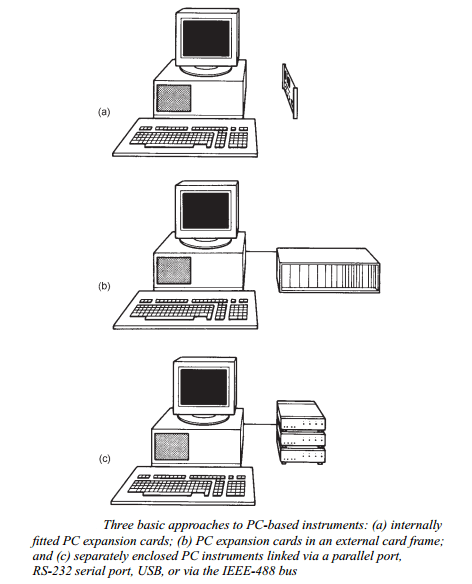Applications
The PC is a potential prime mover in a huge variety of process control and instrumentation applications ranging from simple stand-alone machine controllers to fully integrated production control systems. This chapter aims to provide readers with an introduction to the procedure for selecting and specifying hardware and software for a PC-based instrumentation or process control system. In addition, several representative applications of PC-based systems are discussed.
Expansion cards The range of PC expansion boards currently available from a large number of manufacturers includes:
• Analogue I/O cards with up to 16 analog inputs and up to four buffered analog outputs.
• Digital I/O cards with direct TTL-compatible inputs and outputs.
• Digital I/O cards with opto-isolated inputs and outputs.
• Digital I/O cards with buffered I/O lines.
• Digital output cards fitted with relays or solid-state devices for AC or DC power control.
• EPROM programmers.
• IEEE-488/GPIB interface cards.
• Network adapter cards.
• Modem cards.
• Prototyping cards (these may include the necessary PC ISA/PCI bus interface logic and provide the user with an area for soldering components fitted into a 0.1′′ matrix of plated through holes).
• Serial communications cards for RS-232, RS-422, RS423, or RS-485 serial ports.
• Stepper motor controllers.
• Multi-function I/O cards (offering mixed analog and digital I/O facilities).
• Thermocouple interface cards.
• High-speed data acquisition cards.
• Bus expansion cards (which interface with external card frames or motherboards).
• PC instrument cards (e.g. function generators, counters/digital frequency meters, spectrum analyzers, etc.).
In addition, the system builder is able to select from a large range of signal conditioning cards which provide the necessary interfacing circuitry for a wide range of popular sensors and output devices. It is thus eminently possible to construct a PC-based process control system simply by selecting ‘off-the-shelf’ modules. Only when dealing with very specialized applications it is necessary to manufacture one's own dedicated I/O cards and/or external signal conditioning boards. Appendix J lists a number of major suppliers of PC expansion cards and associated signal conditioning equipment.
Approaches The system designer can select from a range of options depending upon the complexity and individual requirements of a particular application. The following general approaches are available:
• Stand-alone PC systems based on internally fitted expansion cards, rack modules, or separately enclosed units).
• PC systems based on standard PC expansion cards (and I/O processing cards, where appropriate) fitted into external card frame modules.
• Industrial PC systems (using a ruggedized PC functioning as a dedicated process controller or data-gathering device) fitted with internal or external
expansion cards, and housed in a rack or freestanding enclosure.
• RS-232-based systems with the PC as a controller (peripheral hardware connected via an asynchronous serial link).
• IEEE-488-based systems with the PC as a controller.
• Backplane bus-based systems with a PC bus master/controller and a card frame bus.
• Networked/distributed PC systems (e.g. based on Ethernet or BIT BUS) with enclosures and expansion cards to meet local requirements.
PC instruments
In addition to the vast range of expansion cards currently available, several manufacturers have developed a range of dedicated PC instruments that emulate conventional items of test equipment (such as oscilloscopes, counters, function generators, and digital frequency meters). A PC instrument offers many advantages over its conventional counterpart. It is flexible and adaptable and, in many cases, measurements may be automated under programmed control. Furthermore, considerable savings can be achieved from the elimination of redundant hardware (such as displays, operator controls, power supplies, etc.).
PC-based instruments can also offer very significant cost savings when compared with simple IEEE-488 bus-based instrumentation systems. A typical PC-based system for the acquisition of analog voltages can, for example, be realized for less than 50% of the cost of a similarly specified system based on IEEE-488 hardware and software.
PC-based instruments are available in three general formats:
1 Using internally fitted expansion cards (plugged into a free slot in the PC).
2 Using an external rack with plug-in PC expansion cards.
3 Using separately enclosed modules (which may, if desired, be stacked) based on RS-232, USB, or IEEE-488 bus systems.

All three of these approaches have their own particular virtues and the system builder should include all three in his/her portfolio of potential engineering solutions. Internally fitted cards generally offer the lowest cost approach to building a PC instrument. The disadvantage of this technique is that it necessitates internal fitting and, since there may be a limited number of slots available, the expansion capability may be somewhat limited.
An external rack system allows the PC bus to be extended so that standard PC expansion cards may be fitted into an external card frame. This system is, however, relatively expensive and generally only appropriate where large-scale expansion is required. An alternative to that of extending the PC bus beyond the confines of the system enclosure is that of making use of a proprietary I/O bus. Such systems generally provide for between 1 and 32 I/O boards mounted in standard rack industrial computer enclosure.